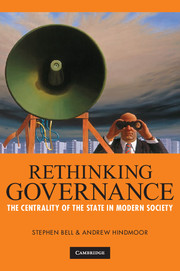Book contents
- Frontmatter
- Contents
- Figures and tables
- Preface
- 1 A state-centric relational approach
- 2 The resilient state
- 3 Metagovernance and state capacity
- 4 Hierarchy and top-down governance
- 5 Governance through persuasion
- 6 Governance through markets and contracts
- 7 Governance through community engagement
- 8 Governance through associations
- 9 Conclusion
- Notes
- Bibliography
- Index
1 - A state-centric relational approach
Published online by Cambridge University Press: 05 June 2012
- Frontmatter
- Contents
- Figures and tables
- Preface
- 1 A state-centric relational approach
- 2 The resilient state
- 3 Metagovernance and state capacity
- 4 Hierarchy and top-down governance
- 5 Governance through persuasion
- 6 Governance through markets and contracts
- 7 Governance through community engagement
- 8 Governance through associations
- 9 Conclusion
- Notes
- Bibliography
- Index
Summary
The word governance derives from the Classical Greek kybernan, meaning to pilot, steer or direct. The term has a long heritage and might be applied to any number of activities. In the Elizabethan Age in England people talked about the governance of the family. These days many use the term corporate governance to refer to the management and control of companies (Kim & Nofsinger, 2007; Maillin, 2007), or more broadly the governance of particular organisations. This book focuses on the increasing use of the term governance to describe the attempts of governments or other actors to steer communities, whole countries, or even groups of countries in the pursuit of collective goals.
A large body of work presents what we call a ‘society-centred’ focus upon governance. The argument is that the last few decades have resulted in a ‘fundamental transformation not just in the scope and scale of government action, but in its basic forms’ (Salamon, 2002, 1–2). National governments are said to have been ‘hollowed out’ by neo-liberal governments intent upon ‘rolling back the frontiers of the ‘state’ (Thatcher, 1993, 744–5), by globalisation, and by the growth of international and occasionally supra-national organisations. The alleged weakening of the state is said to be driven by growing fiscal or legitimacy deficits, by institutional fragmentation, or by pressures from below from social groups wanting more say in policy and governance.
- Type
- Chapter
- Information
- Rethinking GovernanceThe Centrality of the State in Modern Society, pp. 1 - 19Publisher: Cambridge University PressPrint publication year: 2009
- 2
- Cited by



